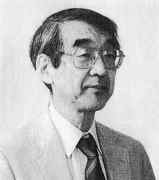Person: Suzuki, Michio

Michio Suzuki was a Japanese mathematician who studied group theory and discovered the groups named after him.
Mathematical Profile (Excerpt):
- Michio Suzuki studied at the Third High School of Japan in Kyoto, entering the school in April 1942.
- Quite often classes could not be held regularly and Suzuki had to go to work in the fields and factories with his classmates.
- The war was reaching its climax in April 1945 when Suzuki entered the University of Tokyo to study mathematics.
- Tokyo was often bombed and on those occasions Suzuki and his fellow students had to escape into the countryside.
- After his undergraduate studies, Suzuki began research in the University of Tokyo's graduate School in April 1948.
- In April 1951, while still working on his dissertation, Suzuki was appointed as a lecturer at Tokyo University of Education.
- Brauer's influence on Suzuki was highly significant and led him towards the most important areas.
- After spending academic year 1956-57 at Harvard University, Suzuki returned to the University of Illinois where he was promoted to associate professor in 1958 and full professor in 1959.
- Let us explain a little about the area in which Suzuki was working.
- In 1957 Suzuki made a major breakthrough.
- For those who know some group theory, we note that Suzuki proved that a finite group of odd order cannot be simple if the centraliser of every non-identity element is abelian.
- Suzuki's discovery of a new class of finite simple groups in 1960 shook mathematics.
- In 1967 Suzuki discovered another new finite simple group.
- Let us return to our sketch of Suzuki's career.
- Although Professor Suzuki was affiliated with the University of Illinois from 1952 until his death, he had a profound influence on the development of group theory (and subsequently of algebraic combinatorics) in Japan.
- We believe it is fair to say that much of the respect given to group theory in Japan as a whole derives from that given to Professor Michio Suzuki as one of the top mathematicians in the world (of course, many other Japanese group theorists deserve credit: nonetheless, the influence of Professor Suzuki was extraordinary).
- Michio Suzuki received many honours for his contributions to group theory.
- In 1974 Suzuki was awarded the Academy Prize from theJapan Academy.
Born 2 October 1926, Chiba, Japan. Died 31 May 1998, Mitaka, Japan.
View full biography at MacTutor
Tags relevant for this person:
Group Theory, Origin Japan
Thank you to the contributors under CC BY-SA 4.0! 

- Github:
-

- non-Github:
- @J-J-O'Connor
- @E-F-Robertson
References
Adapted from other CC BY-SA 4.0 Sources:
- O’Connor, John J; Robertson, Edmund F: MacTutor History of Mathematics Archive
